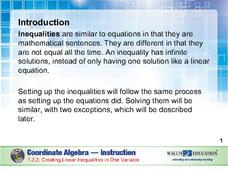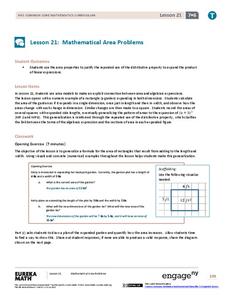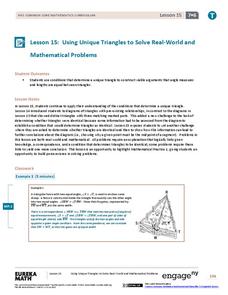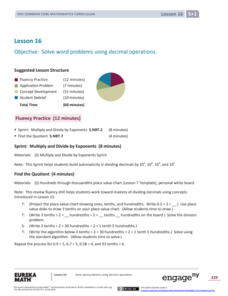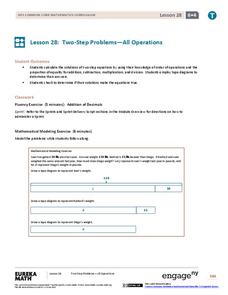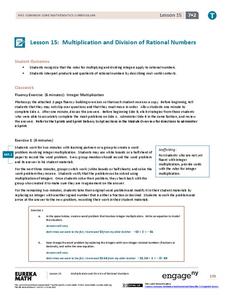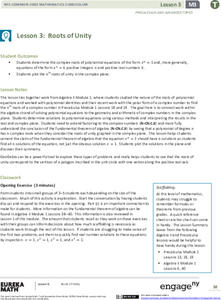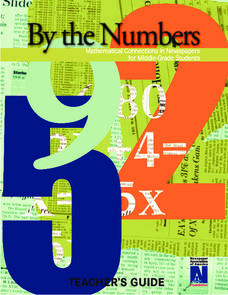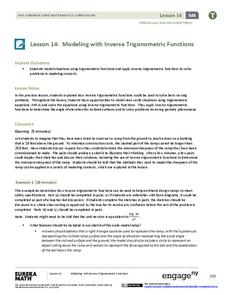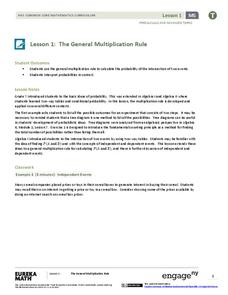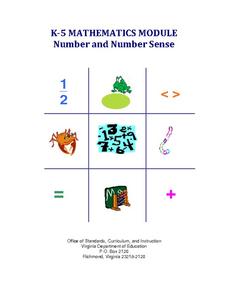Curated OER
Deciphering Word Problems in Order to Write Equations
Help young mathematicians crack the code of word problems with this three-lesson series on problem solving. Walking students step-by-step through the process of identifying key information, creating algebraic equations, and finally...
BW Walch
Creating Linear Inequalities in One Variable
Just when a young mathematician starts to feel comfortable turning word problems into linear equations, shake things up and throw inequalities in the mix. This excellent, instructive presentation takes the steps for solving an...
EngageNY
Mathematical Area Problems
Teach the connection between area models and the distributive property through problem-solving. The 22nd activity in a series of 29 explains the distributive property graphically. Learners build area models from word problems and convert...
EngageNY
Using Unique Triangles to Solve Real-World and Mathematical Problems
How can congruent triangles help mark a soccer field? This is just one question your classes can answer after solving the real-world problems in the lesson. Each example posed through a word problem elicits higher-order thinking and...
EngageNY
Grade 5 Math Module 1, Topic F, Lesson 16
See, decimal operations do come in handy! Pupils solve word problems that require adding, subtracting, multiplying, and dividing decimals. They use tape diagrams to express relationships and to identify the necessary operations to solve...
BW Walch
Creating Linear Equations in One Variable
The example of two travelers meeting somewhere along the road has been a stereotypical joke about algebra as long as algebra has existed. Here in this detailed presentation, this old trope gets a careful and approachable treatment....
EngageNY
Two-Step Problems—All Operations
Step 1: Use the resource. Step 2: Watch your class become experts in solving two-step problems. Scholars learn to solve two-step word problems in context. They use tape diagrams and algebraic techniques to break the problem into two,...
EngageNY
Solving Problems by Finding Equivalent Ratios II
Changing ratios make for interesting problems. Pupils solve problems that involve ratios between two quantities that change. Groups use tape diagrams to represent and solve classroom exercises and share their solutions.
Baylor College
Living Things and Their Needs: The Math Link
Enrich your study of living things with these cross-curricular math activities. Following along with the story Tillena Lou's Day in the Sun, learners will practice addition and subtraction, learn how to measure volume and length,...
EngageNY
Multiplication and Division of Rational Numbers
Partners create integer multiplication word problems and swap them to solve, followed by altering the problem to use rational numbers. By working with word problems involving multiplication and division of rational numbers, pupils...
EngageNY
Solving Equations Using Algebra 2
If you use a fabulous lesson plan, then your pupils can become fabulous at solving equations. The 24th installment of 25 incorporates the use of if-then statements to illustrate the properties of equality used in solving two-step linear...
EngageNY
Putting the Law of Cosines and the Law of Sines to Use
Use the Law of Cosines and the Law of Sines to solve problems using the sums of vectors. Pupils work on several different types of real-world problems that can be modeled using triangles with three known measurements. In the process,...
EngageNY
Roots of Unity
Visualize the nth roots of unity. Pupils calculate the nth roots of unity and find all n roots. Learners plot the solutions in the complex plane and observe that they are the vertices of a regular n-gon inscribed in the unit circle....
EngageNY
Using Permutations and Combinations to Compute Probabilities
Now that we know about permutations and combinations, we can finally solve probability problems. The fourth installment of a 21-part module has future mathematicians analyzing word problems to determine whether permutations or...
EngageNY
Addition and Subtraction of Rational Numbers
Apply addition and subtraction of integers to solve problems with rational numbers. Pupils apply the rules for adding and subtracting integers to add and subtract rational numbers. Class members represent the problem with equations and...
Curated OER
GSE Foundations of Algebra: Equations and Inequalities
Need lessons on writing and solving one- and two-step linear equations and inequalities, as well as systems of equations? This comprehensive 106-page module from the Georgia Department of Education contains many different lessons for a...
Newspaper Association of America
By the Numbers: Mathematical Connections in Newspapers for Middle-Grade Students
A cross-curricular resource teaches and reinforces mathematical concepts with several activities that use parts of a newspaper. Scholars use scavenger hunts to find the different ways math is used in the paper along with using data...
EngageNY
Modeling with Inverse Trigonometric Functions 2
Use inverse trigonometric functions to work with ramps, rabbits, and Talladega. The class models real-world situations with trigonometric functions and solves them using inverses in the 15th installment of a 16-part series. Pupils solve...
EngageNY
Introduction to Simultaneous Equations
Create an understanding of solving problems that require more than one equation. The lesson introduces the concept of systems of linear equations by using a familiar situation of constant rate problems. Pupils compare the graphs of...
EngageNY
The General Multiplication Rule
In the first installment of a 21-part module, scholars build on previous understandings of probability to develop the multiplication rule for independent and dependent events. They use the rule to solve contextual problems.
Curated OER
K-5 Mathematics Module: Number and Number Sense
Reinforce number sense with a collection of math lessons for kindergarteners through fifth graders. Young mathematicians take part in hands-on activities, learning games, and complete skills-based worksheets to enhance proficiency...
Sinclair Community College
Solving Linear Inequalities
Your learners will appreciate the complete picture of linear inequalities presented in this lesson plan. Starting simply with definitions and moving all the way to solving linear inequality word problems this activity is simple to...
State of Michigan
Pre-K Mathematics
Kick-start children's education with this pre-school math unit. Offering 31 different hands-on learning activities that develop young mathematicians' pattern and shape recognition, basic number sense, and much more, this is a...
EngageNY
Modeling with Inverse Trigonometric Functions 1
Where should I stand to get the best view? Pupils use inverse trigonometric functions to determine the horizontal distance from an object to get the best view. They round out the lesson by interpreting their answers within context.

